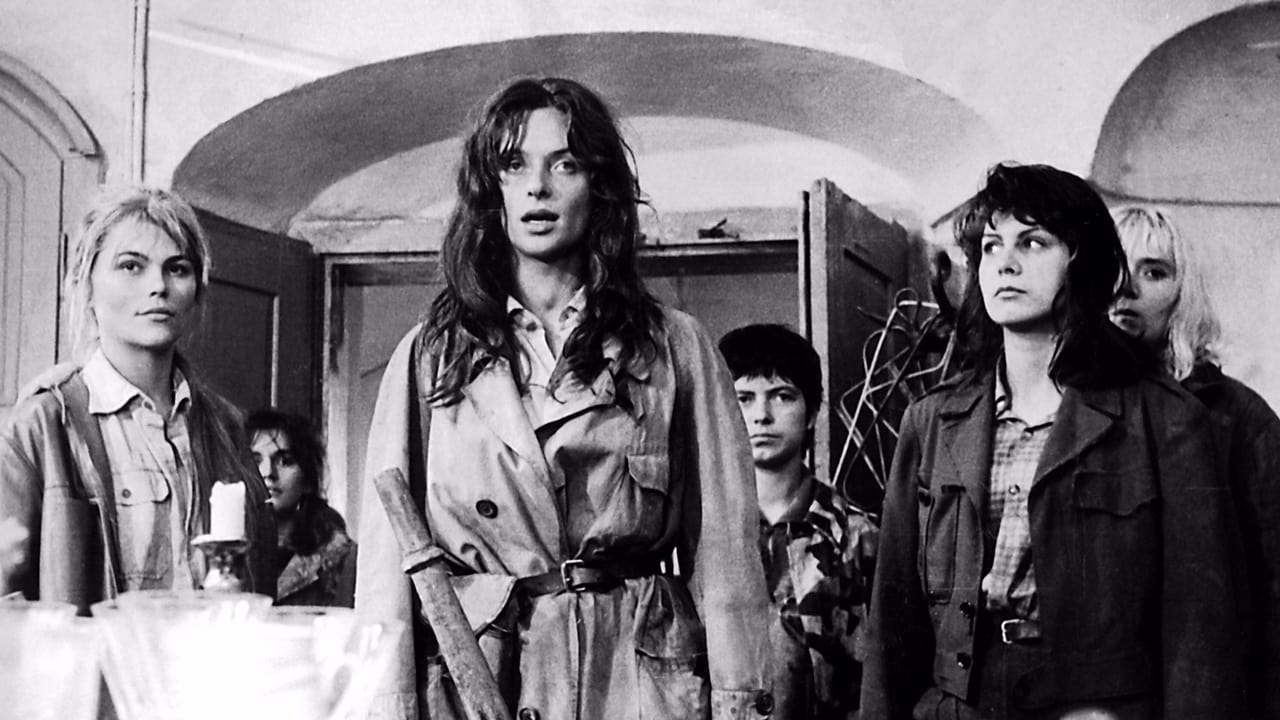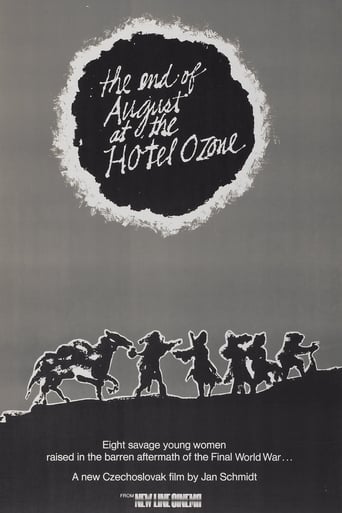

Just perfect...
... View MoreSimple and well acted, it has tension enough to knot the stomach.
... View MoreI wanted to like it more than I actually did... But much of the humor totally escaped me and I walked out only mildly impressed.
... View MoreThe story, direction, characters, and writing/dialogue is akin to taking a tranquilizer shot to the neck, but everything else was so well done.
... View MoreThis one heralds later works, Cormac Mccarthy's The Road and Michael Haneke's Time of the Wolf among them. It's a journey through a bleak barren landscape where characters are lost in it rather than found, set after an unspecified apocalypse that leaves the world an empty desolate place, not the end of the world like in an Emmerich film where destruction is an exciting spectacle to witness as but rather "an" end to the world, a hazy blur of abandonment filled with residues of mystery and nameless violence.The film is a blank canvas. Distraught characters are violent and aimless. The land works by some other order. Where people like Herzog, Malick or Tarkovksy found things of spiritual importance to say on this other order, Schmidt's film is empty and distanced. When the film needs to be stark, animals are murdered for the camera, a dog is shot or a cow is slaughtered. The basic means of expression in The Road are poetic, here they are allegoric. As the characters of McCarthy's novel stagger starved and hopeless through the scorched macadam we can taste bitter ash in our mouths. Here they simply walk through shrubs. We don't fear for their souls, so to speak.And then it gets interesting because the rugged band of amazons stumbles upon the ruins of an old hotel in the middle of the forest and there's an old man living there alone who sees in the young girls (all born after the apocalypse so they don't even have a word for "man" or "grammophone") a new future, new mothers for a new civilization of men. The first among the women, the leader, an old woman who was young before the apocalypse and can remember a time when "the cans didn't rust and the land didn't despise us", she doesn't allow herself to be dragged along on new hope, she is resigned to the end of times. The end is bleak and poignant, a hopeful future is not suggested, and the tiny pocket that preserves the civilization of the old world (where gramophones play music, where cows still make milk) is left behind to rot in the forest. What The End of August at the Hotel Ozone says about the communist regime of the time is at once vague enough to fool censors but clear in emotional duress.This was a very interesting precursor to dystopian films that deal with the end of the world in sombre quiet terms. If it's not terribly successful it's because it's faintly groping in the dark where no one else had gone before, because it uses vague characters to sketch a very clear picture in allegory.
... View MoreThis movie is a stunner, to be sure, and easily decades ahead of its time; the atmosphere of degradation and decay, and just plain desolation, is far beyond anything accomplished in any other film, and I include the immortal MAD MAX 2.However, I have to, HAVE TO, ask the question of whether this film works, as do most Central/Eastern European films, on more than one level, and whether there is inner commentary contained in the film.Watching it, I was struck by the subtext of how the old world has ended, and a new world begun, with new and young people with no knowledge of what went before; this is a basic tenet of radical Communism. The old people, clutching to the remnants of their soft and settled existence, dreaming of a life gone and never to exist again... as the Old One dies, so does the last vestige of any form of culture, or art, of even civilized behavior, and all that is left is a gramophone record of ROLL OUT THE BARREL being carried on horseback by heavily armed and murderous beasts; who themselves lack the capacity to reproduce.I watched this film as a veiled indictment of the Eastern Bloc Communist belief that required history to be eradicated, for a new world to emerge after that holocaust, only to find the act of destruction (with an intent to rebuild) resulted in nothing less than the death of civilization and the creation of savages with no higher conscience. I admit to an influence, though, in that I was in the Balkans during the 'wars' of the 1990s; and one of the most striking and heartbreaking things was many people's belief that Socialism had created a New Man, with no history; and how unfathomably shocked they were to have these fine creations of humanity revealed as violent animals bent on nothing more than mindless destruction.
... View MoreDepicting a dark and nomadic future, The End of August at the Hotel Ozone is a film that was ahead of its time. Much of Hollywood and television have generated many post apocalyptic material in the last twenty years. Whether it has to do with nuclear war becoming more and more realistic or Nostradamus' predictions that the world will end in 2012, or somewhere in between, we will never know. But the entertainment business has cashed in on the very real and terrifying idea, or perhaps actuality.The film directed by Jan Schmidt and made in 1966, is set in an unknown year. To the characters it doesn't matter what year it is and realistically speaking it wouldn't matter anyway. The world has ended through nuclear holocaust and a strong opening conveys this narrative with countdowns spoken in every language, counting down the end of the world, which is fantastic.Following eight young women born after the end, the story involves an older woman who is leading them to find civilization, if any. Everyone else has died including all the males leaving the women to fend for themselves. Much of the film depicts their lives out in the country and it makes for needless and boring stuff, though it has a point. At the end of the world these women have nothing and the director captures a very authentic realism. These eight young women are held at bay by the will of the older woman who is the last inkling of the old, civilized world. Yet the realism goes beyond the boring stuff. The actresses in this film are seen catching runaway horses and mounting them bareback while running and diving doing all their own stunts. In this sense the film sometimes seems as if it is a documentary instead.Halfway through the film they meet up with an old man, a partner for the old woman. The young women don't know what he is, never having seen a man before. The relationship between the two older people is truly heartbreaking. The young women look like savages in front of them and there is a scene where everyone is eating which depicts just that. The old woman on one end and the old man on the other while all the young women in between. In scenes like this the director's voice can be heard loud and clear. This film isn't just about the end of the world; it is a commentary on the human condition which is timeless. The younger generation comes up and destroys what the older generation worked for. Without guidance the children become savages, and generations of the vicious circle will eventually lead us back to the Stone Age, nomadic and primitive. The film ends with the two older people dead and the "children" alone, doing and taking what they please. Jan Schmidt's outlook on life is grim though maybe not entirely untrue.
... View MoreI remember seeing a small handbill in a college basement around 1980. One of the films to be screened was THE END OF AUGUST AT THE HOTEL OZONE. The title intrigued, but, being the typical "too busy College Student" I did not attend the showing. So, for about a quarter century the title just lingered in my memory. Unreachable. I've NEVER heard of it screening anywhere, playing on TV or available on video or DVD (even in bootleg form). The title itself was so tantalizing, promising perhaps something apocalyptic (END OF "THE WORLD" not "AUGUST" perhaps?) or mysterious (a Hotel in the Ozone Layer?). And, of course, its sheer scarcity could only enhance the mystery, the suspense. Then, there it was in the American Cinemateque schedule. Oh, NO, I wasn't going to miss it this time! I had been up for work since 4 AM (!) and had worked a full 12 hour day. But, I was NOT to be denied! While the film does not quite live up to its evocative title (there was no reasonable way it could), it's still a find Eastern European contribution to the Post-Nuke, End-Of-The-World and Lord of the Flies sub-genre(s). After an oblique reference to the Nuclear calamity that man inflicted upon itself some 15 years earlier, the film proper begins slowly as we come to see a band of young, presumably fertile women, led by a wise old sage. I emphasize the word slowly, because the pace is off-putting at first. Events do happen and we get a picture of the women's pathetic and lonely existence. I particularly admired the fact that they are not scrubbed clean, shaved, manicured and primped and prettified as they doubtless would have been in an American production - Remember all those "lost women" films where the tribal women look like beauty contestants (indeed a couple of the actresses are very attractive, just unkempt)?! But, the glacial pacing is almost enough to drive most viewer's patience beyond the brink. Once the group stumbles upon an old man and his "Hotel Ozone", the film comes into its own. Where the viewer is naturally inclined to sympathize with the women (if they had been men would we be so accepting?) despite some cruel, savage and disturbing activities (particularly towards animals), slowly we come to see a fuller and less positive view towards them. This reversal is doubtless intentional and packs a strong visceral punch. The final images of this band of lost ladies wandering a barren landscape is both heart-breaking and depressingly believable. It's to the film's credit that we are not given a false or tidy ending: Befitting a title as gloriously ambiguous as THE END OF AUGUST AT THE HOTEL OZONE.
... View More